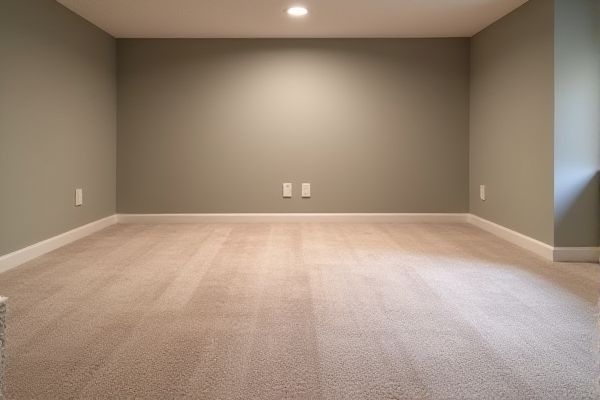
Vinyl flooring offers superior moisture resistance and durability for basements prone to dampness, while carpet provides warmth and comfort but can absorb moisture leading to mold growth. Explore this article to determine which flooring choice best suits your basement's conditions and your lifestyle needs.
Table of Comparison
| Feature | Carpet Flooring | Vinyl Flooring |
|---|---|---|
| Moisture Resistance | Low - prone to mold and mildew in damp basements | High - waterproof, ideal for moisture-prone basements |
| Durability | Moderate - wears down with heavy traffic and moisture exposure | High - scratch and stain resistant, long-lasting |
| Comfort | High - soft and warm underfoot, adds insulation | Moderate - firmer surface, can add underlayment for cushioning |
| Maintenance | High - requires frequent cleaning, difficult to remove stains | Low - easy to clean with water and mild detergent |
| Installation | Easy - DIY-friendly, requires padding | Moderate - click-lock or glue-down methods, professional help recommended |
| Cost | Low to Moderate - affordable materials, varies by quality | Moderate - slightly higher initial cost, better long-term value |
| Appearance | Varied textures and colors, cozy aesthetic | Wide range of styles, including wood and stone looks |
| Ideal Use | Finished basements with low humidity | Basements prone to moisture and heavy traffic |
Carpet vs Vinyl Flooring: Key Considerations for Basements
Carpet in basements offers warmth and comfort but may harbor moisture and promote mold growth, making it less ideal for damp environments. Vinyl flooring provides superior water resistance, durability, and ease of maintenance, making it the preferred choice for basement applications prone to humidity. Choosing between carpet and vinyl depends on moisture levels, desired comfort, and long-term upkeep requirements for basement flooring.
Moisture Resistance: How Carpet and Vinyl Perform in Basements
Vinyl flooring offers superior moisture resistance in basements, preventing water damage and mold growth due to its waterproof properties and easy maintenance. Carpet, while providing warmth and comfort, is prone to absorbing moisture, leading to potential mildew and structural issues if not properly managed. Choosing vinyl flooring can protect your basement from moisture-related problems, making it a practical option for damp environments.
Installation Challenges: Carpet vs Vinyl in Basement Environments
Carpet installation in basements often faces challenges due to moisture and uneven surfaces, increasing the risk of mold and mildew growth if not properly managed. Vinyl flooring offers greater moisture resistance and can be installed over a variety of subfloors, making it more adaptable to basement conditions. When choosing flooring for your basement, consider vinyl for easier installation and better durability in damp environments.
Comfort and Warmth: Choosing the Best Flooring for Basement Living Spaces
Carpet flooring provides superior comfort and warmth for basement living spaces due to its soft texture and insulating properties, which help retain heat in cooler environments. Vinyl flooring, while durable and moisture-resistant, often feels cooler underfoot and can require additional rugs to achieve the same level of warmth. When selecting flooring for your basement, prioritize carpet if comfort and warmth are your top concerns.
Durability and Maintenance: Carpet vs Vinyl in High-Traffic Basements
Vinyl flooring offers superior durability and low maintenance in high-traffic basements, resisting moisture, stains, and wear better than carpet. Carpet tends to absorb moisture and dirt, leading to potential mold growth and frequent cleaning requirements in damp basement environments. Vinyl's easy-to-clean surface and resilience make it a practical choice for maintaining a fresh and durable basement floor.
Cost Comparison: Budgeting for Carpet or Vinyl Basement Flooring
Carpet flooring in basements typically costs between $2 to $7 per square foot, including materials and installation, making it a budget-friendly option with added warmth and comfort. Vinyl flooring ranges from $3 to $10 per square foot, offering durability and moisture resistance, which is crucial for basement environments prone to dampness. When budgeting, consider that vinyl's longevity and low maintenance may offset its higher initial cost, while carpet may require more frequent replacement in wet conditions.
Design and Style Options: Customizing Your Basement Floor
Carpet flooring offers warmth and a variety of textures and colors, allowing you to create a cozy and inviting basement atmosphere. Vinyl flooring provides extensive design versatility with options like wood-look planks, stone patterns, and vibrant colors, perfectly suited for modern, durable basement floors. Your choice depends on the level of moisture resistance needed and personal style preferences to customize your basement floor effectively.
Soundproofing: Which Flooring Reduces Noise in Basements?
Vinyl flooring offers superior soundproofing in basements due to its dense, resilient surface that absorbs impact noise more effectively than carpet. Carpet provides moderate noise reduction by dampening footsteps and echo through fibers but can trap moisture, leading to potential mold issues in humid basement environments. For optimal soundproofing combined with moisture resistance, vinyl flooring is the preferred choice in basement installations.
Health and Allergy Factors: Carpet vs Vinyl in Basement Air Quality
Vinyl flooring in basements significantly improves indoor air quality compared to carpet by reducing dust mites, mold, and allergens that typically accumulate in carpet fibers. Vinyl's moisture resistance prevents mold growth, a common issue in damp basement environments that exacerbates respiratory problems and allergies. Choosing vinyl flooring promotes a healthier basement atmosphere, especially for individuals with asthma or sensitive respiratory systems.
Pros and Cons Summary: Making the Best Basement Flooring Choice
Carpet provides warmth and comfort in basements but is prone to moisture damage and mold growth, requiring careful maintenance and potential replacement in damp conditions. Vinyl flooring offers excellent water resistance, durability, and ease of cleaning, making it ideal for moisture-prone basements, though it may lack the cushioned feel and insulation properties carpet delivers. Choosing between carpet and vinyl depends on basement humidity levels, desired comfort, and maintenance preferences to ensure a functional and comfortable space.
 homyna.com
homyna.com